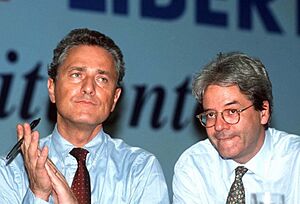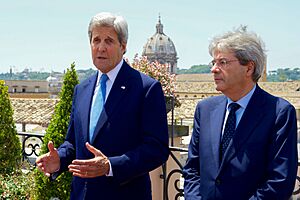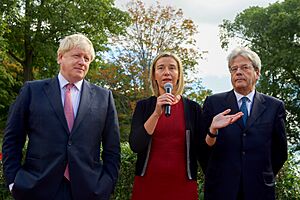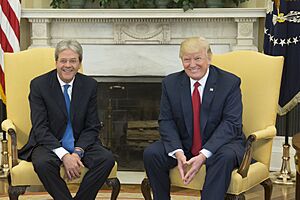Paolo Gentiloni facts for kids
Quick facts for kids
Paolo Gentiloni
|
|
|---|---|
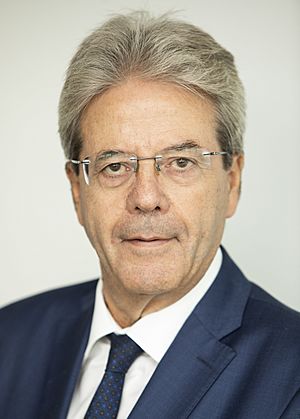
Official portrait, 2019
|
|
| European Commissioner for Economy | |
| In office 1 December 2019 – 30 November 2024 |
|
| President | Ursula von der Leyen |
| Preceded by | Pierre Moscovici |
| Succeeded by | Valdis Dombrovskis |
| Prime Minister of Italy | |
| In office 12 December 2016 – 1 June 2018 |
|
| President | Sergio Mattarella |
| Preceded by | Matteo Renzi |
| Succeeded by | Giuseppe Conte |
| Minister of Foreign Affairs | |
| In office 31 October 2014 – 12 December 2016 |
|
| Prime Minister | Matteo Renzi |
| Preceded by | Federica Mogherini |
| Succeeded by | Angelino Alfano |
| Minister of Communications | |
| In office 17 May 2006 – 8 May 2008 |
|
| Prime Minister | Romano Prodi |
| Preceded by | Mario Landolfi |
| Succeeded by | Claudio Scajola |
| President of the Democratic Party | |
| In office 17 March 2019 – 22 February 2020 |
|
| Secretary | Nicola Zingaretti |
| Preceded by | Matteo Orfini |
| Succeeded by | Valentina Cuppi |
| Member of the Chamber of Deputies | |
| In office 30 May 2001 – 2 December 2019 |
|
| Constituency | Piedmont (2001–2006) Lazio (2006–2018) Rome (2018–2019) |
| Personal details | |
| Born |
Paolo Gentiloni Silveri
22 November 1954 Rome, Italy |
| Political party | MLS (1976–1981) PdUP (1981–1984) Dem (1999–2002) DL (2002–2007) PD (since 2007) |
| Height | 1.77 m (5 ft 10 in) |
| Spouse |
Emanuela Mauro
(m. 1989) |
| Education | Sapienza University of Rome |
| Signature |  |
Paolo Gentiloni Silveri (born 22 November 1954) is an Italian politician. He served as the European Commissioner for Economy in the von der Leyen Commission from December 2019 to November 2024. Before that, he was the Prime Minister of Italy from December 2016 to June 2018.
Gentiloni had a long career in local politics before being elected to the Chamber of Deputies in 2001. He was the Minister of Communications from 2006 to 2008 under Romano Prodi. In 2007, he helped start the Democratic Party and later became its president from 2019 to 2020. He also served as Minister of Foreign Affairs from 2014 to 2016 in Matteo Renzi's government. After Renzi resigned, President Sergio Mattarella chose Gentiloni to be Prime Minister in December 2016.
Even though many thought he would only be a temporary Prime Minister, Gentiloni managed to pass important laws. These included new rules for healthcare decisions and a new election law. He also introduced stricter rules for immigration and social security to help with the European migration crisis. In foreign policy, he continued his work as Foreign Minister, supporting a strong European approach. He also built good relationships with Arab countries and helped improve Italy's relations with India. Gentiloni resigned as Prime Minister after the 2018 election. In September 2019, he was chosen to be Italy's new European Commissioner, where he focused on the European Union Economy.
Contents
Early Life and Education
Paolo Gentiloni was born in Rome, Italy, in 1954. He comes from a noble family, the Gentiloni Silveri. He is related to Vincenzo Ottorino Gentiloni, an important Catholic political leader from the past.
As a child, he went to a Montessori school. There, he became friends with Agnese Moro, whose father, Aldo Moro, was a famous Italian Prime Minister. In the 1970s, he studied at a high school in Rome and later earned a degree in political sciences from the Sapienza University of Rome. Before becoming a politician, Gentiloni worked as a journalist.
In 1989, he married Emanuela Mauro, who is an architect. They do not have children. Gentiloni can speak English, French, and German very well.
Starting His Political Journey
In the 1970s, Paolo Gentiloni was active in student movements. He later joined a socialist group and became a regional leader. Over time, he became more interested in green politics and protecting the environment.
He became the director of La Nuova Ecologia ("The New Ecology"), a newspaper about environmental issues. Through this work, he met Francesco Rutelli, a young leader of the Green party. Gentiloni became one of Rutelli's closest advisors.
Working for Rome City Council
In 1993, Gentiloni helped Rutelli in his campaign to become Mayor of Rome. After Rutelli won, Gentiloni was appointed as a city council member, focusing on the Great Jubilee event and tourism.
He stayed in this role until 2001. That year, Rutelli resigned to run for Prime Minister, but he lost the election.
Becoming a Member of Parliament
In the 2001 general election, Gentiloni was elected as a Member of Parliament. This marked the start of his career in national politics. In 2002, he helped create a new party called The Daisy. He was the party's spokesperson for communications for five years.
From 2005 to 2006, he led a committee that watched over the state television broadcaster, RAI. He was re-elected in the 2006 election. After his coalition won, Gentiloni became the Minister for Communications in Romano Prodi's government from 2006 to 2008.
As minister, Gentiloni wanted to change the Italian television system. He aimed to reduce the amount of advertising. However, his plans were not fully approved because the government faced a crisis.
In 2007, he was one of the people who helped create the Democratic Party. He was re-elected to Parliament in the 2008 election. In 2013, he ran to become Mayor of Rome but did not win.
Despite this, Gentiloni was elected to the Chamber of Deputies again in the 2013 election. He supported Matteo Renzi in the election for the leader of the Democratic Party.
Minister of Foreign Affairs
On 31 October 2014, Prime Minister Matteo Renzi appointed Gentiloni as the Minister of Foreign Affairs. He took over from Federica Mogherini.
As Foreign Minister, Gentiloni worked to find a balanced approach for Italy in many difficult situations, like the wars in Libya and Syria, and tensions with Russia. He worked closely with the US Secretary of State, John Kerry, and also kept open talks with Russia's Foreign Minister, Sergei Lavrov.
In February 2015, Gentiloni said that Italy was ready to act in Libya against the Islamic State if needed. The Islamic State then threatened him.
In March 2015, Gentiloni visited Mexico and Cuba. He met Cuban President Raúl Castro and offered Italy's support for improving relations between Cuba and the United States.
In July 2015, a car bomb exploded outside the Italian consulate in Cairo, Egypt. The Islamic State claimed responsibility. Gentiloni stated that Italy would not be scared and would continue fighting terrorism.
In December 2015, Gentiloni hosted a peace meeting in Rome. Representatives from the different groups involved in the civil war in Libya attended, along with officials from the United Nations, the United States, and Russia.
As Foreign Minister, Gentiloni also dealt with cases of Italian citizens being kidnapped. In January 2015, he helped negotiate the release of two Italian students who had been held hostage in Syria.
Another important case was the murder of Giulio Regeni, an Italian student who was killed in Cairo in 2016. His body showed signs of severe torture. Many in Europe suspected the Egyptian police were involved, though Egypt denied this.
In 2016, Italy and the Netherlands were both trying to get a seat on the United Nations Security Council. After many votes, Gentiloni and his Dutch counterpart agreed to share the two-year term. This was the first time in over 50 years that two countries agreed to split a term like this.
Prime Minister of Italy
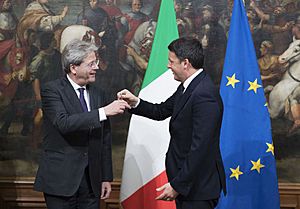
On 7 December 2016, Prime Minister Matteo Renzi resigned after his proposed changes to the Senate were rejected in a public vote. On 11 December, President Mattarella asked Gentiloni to form a new government. Gentiloni officially became Prime Minister on 12 December.
Gentiloni led a government supported by the Democratic Party and other smaller parties. This was similar to the group that had supported Renzi. His government won votes of confidence in both the Chamber of Deputies and the Senate.
In July 2017, Gentiloni also took on the role of Minister of Regional Affairs temporarily after the previous minister resigned.
On 24 March 2018, after new leaders were chosen for the two houses of Parliament, Gentiloni resigned as Prime Minister. However, he stayed in office until 1 June, when Giuseppe Conte became the new Prime Minister.
Social Policies and Healthcare
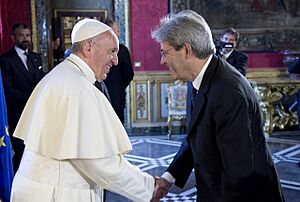
In May 2017, Gentiloni's government approved a law that made some vaccines mandatory again. This increased the number of required vaccines from 4 to 12. Children who were not vaccinated could not attend school.
In December 2017, Parliament approved a law about advance healthcare directives, also known as "living wills." This law allows people to decide what medical actions should be taken for them if they can no longer make decisions themselves. It also allowed people to refuse end-of-life care. This law was supported by many parties, including the Democratic Party.
The Catholic Church, led by Pope Francis, did not strongly object to the living will law. They said it was important to find a balance and avoid too much medical treatment.
Work and Economy
In March 2017, the government stopped the use of labor vouchers. These were like special tickets used for one-off work services. Gentiloni said he made this decision to avoid another public vote on the issue.
By March 2018, the unemployment rate in Italy was around 11%, which was lower than in previous years. The number of unemployed young people was also the lowest since 2011. Many saw this as a sign that the Italian economy was getting stronger after a difficult period.
Immigration Policies
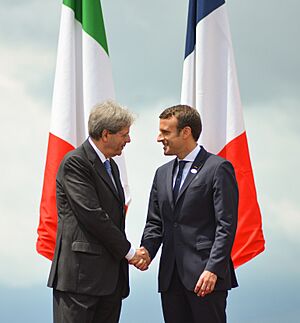
A big challenge for Gentiloni as Prime Minister was the large number of illegal immigrants arriving in Italy. In February 2017, he made agreements with Libya and Tunisia to try and stop migrants from crossing the Mediterranean Sea.
Gentiloni and his Interior Minister, Marco Minniti, introduced stricter rules for immigration and public security. Their goal was to reduce the number of immigrants coming to Italy and to counter anti-immigrant messages from some political parties. In July 2017, the government introduced the "Minniti Code." This code set rules for NGOs that rescue asylum seekers in the Mediterranean.
The code, among other things, stopped NGO ships from entering Libyan waters. Some NGOs refused to sign the code, saying it was illegal and would not save lives.
In December 2017, Gentiloni announced a peacekeeping mission to Niger. This involved sending 450 Italian soldiers to help local forces fight against human traffickers and Islamic terrorism. This agreement was made with French President Emmanuel Macron.
Election Law Changes
After the rejection of the constitutional reform, Parliament needed to change the election law. The Democratic Party proposed a new law called Rosatellum. This law was similar to one used in Italy from 1993 to 2005.
The Rosatellum used a mixed system for elections. Some seats were decided by who got the most votes in a specific area, and others were given out based on the total percentage of votes a party received. This new law was supported by the Democratic Party and other parties.
Despite protests from some opposition parties, the election law was approved by the Chamber of Deputies in October 2017.
Foreign Relations
Paolo Gentiloni strongly supports European integration and cooperation among European countries. As Prime Minister, he dealt with several international challenges, including economic issues in Europe, the civil war in Libya, and the fight against the Islamic State. He built good relationships with leaders like Canadian Prime Minister Justin Trudeau, UK Prime Minister Theresa May, German Chancellor Angela Merkel, and French President Emmanuel Macron.
In April 2017, he visited the White House and met US President Donald Trump. They discussed important issues like the civil wars in Libya and Syria, and their partnership against Islamic terrorism.
As Prime Minister, he hosted the 43rd G7 summit in Taormina, Sicily. This was the first G7 summit for him and also for President Trump, Prime Minister May, and President Macron.
Gentiloni also built strong relationships with Arab countries in the Persian Gulf. He visited the Arab peninsula three times, focusing on trade agreements, especially related to oil. He met leaders in Kuwait, Saudi Arabia, Qatar, and the United Arab Emirates.
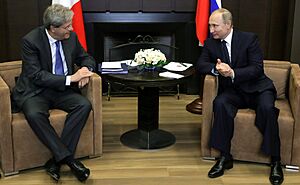
In May 2017, he traveled to China to meet President Xi Jinping and Prime Minister Li Keqiang. They discussed China's "One Belt One Road Initiative," which aims to improve connections and cooperation between countries in Eurasia. Gentiloni said that Italy could play a key role in this project.
Later in May, he visited Sochi, Russia, and met Russian President Vladimir Putin. They hoped for better talks between Russia and NATO and signed economic agreements.
In September, Prime Minister Gentiloni spoke at the United Nations General Assembly in New York City. He talked about climate change, the migrant crisis, and fighting Islamic terrorism.
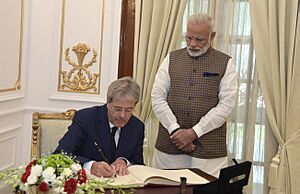
In October, Gentiloni visited India and met Prime Minister Narendra Modi. After some years of tension due to a past incident, the two countries improved their relationship. They signed economic agreements. Gentiloni was the first Italian leader to visit India since 2007.
During his time as Foreign Minister and Prime Minister, Gentiloni started the Italy–Africa initiative. This included cooperation on renewable energy and new aid for healthcare and culture. Fighting terrorism was a key part of his plan, as was stopping migration from West Africa through North Africa to Italy. In November 2017, he visited Tunisia, Angola, Ghana, and Ivory Coast to discuss these issues and sign agreements.
2018 General Election
On 28 December 2017, President Sergio Mattarella dissolved Parliament and called for new elections on 4 March 2018. Gentiloni remained Prime Minister during this time. During the 2018 Italian general election campaign, some members of the Democratic Party suggested that Gentiloni should be the party's candidate for Prime Minister instead of Matteo Renzi. However, Gentiloni did not support this idea, and Renzi remained the party leader.
The election results showed that the center-right alliance won the most seats, and the Five Star Movement became the party with the most individual votes. The center-left coalition, led by Renzi, came in third. After several months of talks, the League and the Five Star Movement formed a government led by Giuseppe Conte. Gentiloni resigned as Prime Minister on 1 June 2018.
Gentiloni did not run for the leadership of the Democratic Party. He continued to be a Member of Parliament and often spoke out against the policies of Matteo Salvini, especially on immigration. In October 2018, Gentiloni supported Nicola Zingaretti in the election for the new leader of the Democratic Party. After Zingaretti won, he appointed Gentiloni as the President of the Democratic Party in March 2019.
European Commissioner for Economy
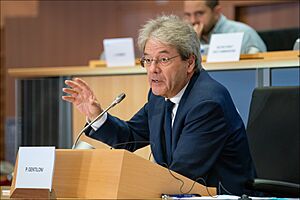
In August 2019, there were disagreements between the League and the Five Star Movement (5SM), which led to the Prime Minister, Giuseppe Conte, offering his resignation. However, Gentiloni helped the Democratic Party decide to form a new government with the 5SM. This new government focused on being pro-European, supporting a green economy, sustainable development, fighting economic inequality, and having a new immigration policy. Conte remained Prime Minister.
On 5 September 2019, the new government was sworn in. Later that day, Conte announced that Gentiloni would be Italy's new European Commissioner. On 10 September, Ursula von der Leyen announced that Gentiloni would be the Commissioner for Economy if approved by the European Parliament. The Parliament's committee approved his nomination on 3 October.
On 30 November, Gentiloni announced he was leaving the Chamber of Deputies after almost 19 years. His resignation became official on 2 December. In his final speech, he promised to balance Italy's interests with Europe's interests, saying he was a "patriot" who believed the best way to help Italy was within Europe. On 1 December 2019, he officially started his new role in the European Commission.
In early 2020, Gentiloni was part of a special team created by President von der Leyen to coordinate the European Union's response to the COVID-19 pandemic. This team developed the Next Generation EU program, a large economic recovery plan to help countries affected by the pandemic. This fund was worth €750 billion and operated from 2021 to 2023.
Later Career
In late 2024, the United Nations Secretary-General, António Guterres, appointed Gentiloni to a group of experts. This group's goal is to find solutions and gain support to help solve the debt crisis in developing countries.
Health
On 10 January 2017, after a trip to Paris, Gentiloni had a heart issue and needed an emergency procedure called an angioplasty. The next day, he tweeted that he was feeling well and would return to work soon. He received many well wishes from other leaders, including President Sergio Mattarella and Canadian Prime Minister Justin Trudeau.
Images for kids
See also
 In Spanish: Paolo Gentiloni para niños
In Spanish: Paolo Gentiloni para niños
 | Ernest Everett Just |
 | Mary Jackson |
 | Emmett Chappelle |
 | Marie Maynard Daly |


